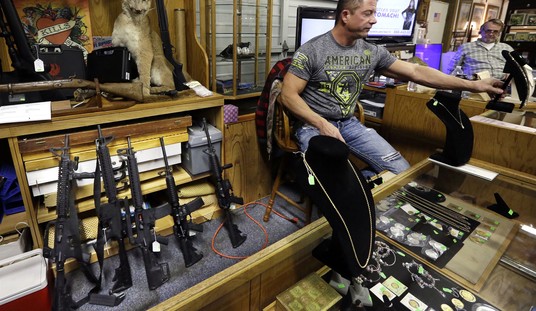Modern technology makes gun control measures even weaker as criminals continue to unlawfully use firearms while law-abiding citizens continue to follow the law.
“Three-D metal printers make guns that look and function in exactly the same way as any metal gun would,” said John Richard Lott Jr., founder and president of the Crime Prevention Research Center, a research and education organization that studies the relationship between laws regulating the ownership or use of guns, crime, and public safety.
Proposed laws that seek to regulate the purchase of 3-D printers will have an opposite impact on violent crimes just as gun bans or background checks do, said Lott. “It is already very difficult to stop criminals from getting a particular gun to use, it is simply impossible to try and stop them from printing-off their own gun.”
Gun control laws mostly protects criminals and penalizes law-abiding citizens, he said. “We have good citizens turning in their guns that are now illegal, but not the criminals.”
While laws take some guns away from criminals, they primarily take guns away from law-abiding citizens putting them at a disadvantage, he said. “Disarming law-abiding citizens relative to criminals we actually make it easier for them to go and commit crimes since they have less to worry about when a potential victim cannot defend themselves.”
Regardless of the motivation behind gun control laws, the impact on crime has an opposite, unintended effect, he said. “Where guns are banned, not just in the U.S. but around the world, we see big increases in murder and violent crime rates.”
Secretary General Ron Noble, the head of Interpol, the international police agency, has changed views over the years with respect to gun-free zones, said Lott who is the author of eight books Including the 3rd edition of “More Guns, Less Crime”.
“Noble is now convinced that it is virtually impossible to make secure areas. Criminals or terrorists plan these things in advance; they are going to find a way to get weapons into an area.”
The problem with gun free zones is that law-abiding citizens are the ones who obey the ban, not the criminals, he said. “If you cannot secure an area yet try to ban guns, you make it easier for the criminal to go and commit their attack.”
In May 2012, when the software to assemble a firearm from a 3-D plastic printer was made available on the internet, downloads of the software reached 100,000 in about a day, he said. “At the end of two-weeks there were 4,000 computer servers around the world where you can go to and download the software.”
First developed in the 1980s, additive manufacturing or 3-D printing, which is the process of making a three-dimensional solid object from a digital model, was first sold in the commercial market in the early 2010s.
One big change in today’s technological market is the development of the 3-D metal printer that can print an exact replica of a metal gun one could purchase from a gun manufacturer, said Lott who is a Fox News columnist. “This makes it impossible for someone who is looking at a gun to tell the difference between a gun that came from a metal printer or from a gun maker.”
Metal 3-D rinters are coming-down in price and relatively common, he said. “We are not going to be able to stop people from getting a hold of these printers and using them.”
The problem with gun control laws such as compulsory background checks or gun bans or banning certain types of guns is it has been very hard to enforce because it is difficult to stop criminals from getting the types of guns that they want, he said.
The concern with technological changes is essentially the same as banning certain types of guns, he said. “Law-abiding citizens will turn in their guns whereas criminals will find access to any gun they chose.”
New technological advances in 3D printing mean the laws are increasingly likely only to disarm the law-abiding, making it easier for criminals to commit crime, said Lott, a world-recognized economist, who first researched gun violence with the intent of supporting the benefits of restricting gun rights–until he kept coming up with the opposite findings.
“Gun control, which is already really difficult to successfully accomplish to begin with, has just gotten so much more difficult.”









Join the conversation as a VIP Member